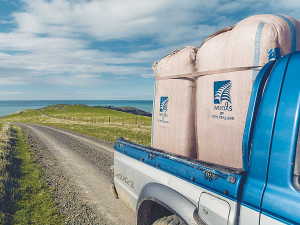Wools of New Zealand and PGG Wrightson team up to boost wool supply chain efficiency
Wool farmers are hoping that efforts by two leading companies to develop a more efficient supply chain would eventually boost farmgate returns.
 Wools of New Zealand hopes the new deal will help fight counterfeiters and highlight the prestige of its product to Chinese consumers.
Wools of New Zealand hopes the new deal will help fight counterfeiters and highlight the prestige of its product to Chinese consumers.
Farmer-owned wool fibre and carpet producer Wools of New Zealand hopes that its new partnership with a major Chinese carpet and rug manufacturer will help combat counterfeiters in the global market and highlight the prestige of New Zealand wool to Chinese consumers.
Wool products falsely claiming to use NZ wool and carrying the Fern logo trademarked by the company have been found in the past around the world, including upholstery in Scandinavia and on carpets in the UK.
Wools of NZ chief executive John McWhirter told Rural News that they have found similar Fern symbols that resemble its own on wool carpets and have taken legal action to stop the misleading of consumers.
“This highlights the importance of an international team and partnerships. If we are not there, we cannot see it to stop it.”
Last month’s agreement allows Yangxin Ruixin to use Wools of New Zealand branding on its products as a mark of provenance and integrity. Founded in 1998 and located in the Shandong province, Yangxin Ruixin sells its products under the Silktouch brand in China, while exporting under the Ruixin brand. It produces a range of types of carpets and rugs for the commercial, hospitality and residential markets and operates the largest hand-tufted factory in China, with 3000 employees.
While Wools of New Zealand already has an extensive trade partner network internationally, this is the first arrangement the farmer-owned company has entered with a Chinese manufacturer to produce branded carpets.
“We already work with a New Zealand exporter to China and supply a yarn spinner who sells our farmers’ product into a range of companies in the Chinese market,” said McWhirter.
“However, this is our first agreement with a Chinese company producing branded products. Yangxin Ruixin will be able to use the Wools of New Zealand logo on their products that contain at least 60% Wools of New Zealand-supplied fibre.”
McWhirter says an advantage of the agreement is the ability of Yangxin Ruixin to monitor any Chinese manufacturers falsely claiming to be using Wools of New Zealand wool.
“Counterfeit wool claiming to be New Zealand wool does get sold. We have acted in the past against companies using our logo without permission.
“However, it is hard for us to police that in China, so it is very good to have a partner and ‘eyes in the market’ there. Working with Yangxin Ruixin means they have a brand-authenticated product and an interest in protecting the brand.”
McWhirter says they see ‘New Zealand Wool’ carpets across the world that on inspection contain fibres and contamination that does not originate in New Zealand.
“The temptation for spinners in China, India, and Europe to dilute New Zealand wool with cheaper fibre, to meet price points from retailers is immense.
“This is why ingredient branding is so critical to be able to ensure consumers are not sold counterfeit wool products. We talk about false claims globally; no different to what happened to the Kiwifruit industry, an issue solved with the Zespri brand. Without a protected brand on our wool, we have no way to stop false claims.
“The ‘Fernmark’ symbol is owned and protected by Wools of New Zealand for use on wool textiles around the globe. We have invested heavily in copyright over the last 40 years and still do today.”
Grace Su, a recent optometry graduate from the University of Auckland, is moving to Tauranga to start work in a practice where she worked while participating in the university's Rural Health Interprofessional Programme (RHIP).
Two farmers and two farming companies were recently convicted and fined a total of $108,000 for environmental offending.
According to Ravensdown's most recent Market Outlook report, a combination of geopolitical movements and volatile market responses are impacting the global fertiliser landscape.
Environment Canterbury, alongside industry partners and a group of farmers, is encouraging farmers to consider composting as an environmentally friendly alternative to offal pits.
A New Zealand dairy industry leader believes the free trade deal announced with India delivers wins for the sector.
The Coalition Government will need the support of at least one opposition party to ratify the free trade deal with India.